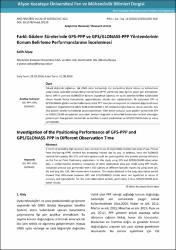| dc.contributor.author | Alçay, Salih | |
| dc.date.accessioned | 2017-09-26T06:16:09Z | |
| dc.date.available | 2017-09-26T06:16:09Z | |
| dc.date.issued | 2016 | |
| dc.identifier.issn | 2149-3367 | |
| dc.identifier.uri | http://fenbildergi.aku.edu.tr/1602/025501(292-302).pdf | |
| dc.identifier.uri | http://hdl.handle.net/11630/4528 | |
| dc.description.abstract | Yüksek doğruluk sağlaması, tek GNSS alıcısı kullanıldığı için maliyetinin düşük olması ve kullanımının
kolay olması nedeniyle Hassas Nokta Konumlama (PPP) yöntemine olan ilgi her geçen gün artmaktadır.
Ayrıca GPS’in yanı sıra GLONASS’ın da tam kapasiteye ulaşması ve bu iki sistemin birlikte kullanılabilir
olması Hassas Nokta Konumlama uygulamalarına olumlu etki sağlamaktadır. Bu çalışmada GPS ve
GPS/GLONASS gözlem verileri kullanılarak statik PPP sonuçlarının kapsamlı bir istatistiki değerlendirmesi
yapılmıştır. Değerlendirme işlemi farklı enlemlerdeki 4 IGS noktasına ilişkin kısa (1s, 3s) ve uzun (6s, 12s,
24s) gözlem süreleri kullanılarak gerçekleştirilmiştir. Elde edilen sonuçlar uzun gözlem sürelerinde GPS
ve GPS/GLONASS sonuçlarının arasındaki farkların doğruluk ve tekrarlılık bakımından anlamlı olmadığını
göstermiştir. Kısa gözlem sürelerinde ve özellikle 1 saatlik çözümlerde ise GPS/GLONASS daha iyi sonuç
vermektedir. | en_US |
| dc.description.abstract | In terms of providing high accuracy, low cost due to use of single GNSS receiver and ease of use, Precise
Point Positioning (PPP) method has increasing interest day by day. In addition, since the GLONASS
reached full capacity like GPS, and both system could be used together, this provide positive influence
on the Precise Point Positioning applications. In this study using GPS and GPS/GLONASS observation
data, a comprehensive statistical evaluation of static observation data was made using PPP results.
Evaluation process was performed with 4 IGS stations at different latitude regions by using short (1h,
3h) and long (6h, 12h, 24h) observation durations. The results obtained in the long observation period
showed that differences between GPS and GPS/GLONASS results were not significant in terms of
accuracy and repeatability. For the short observation periods, particularly 1 hour, GPS/GLONASS gives
better results. | en_US |
| dc.language.iso | tur | en_US |
| dc.publisher | Afyon Kocatepe Üniversitesi, Fen ve Mühendislik Bilimleri Dergisi | en_US |
| dc.identifier.doi | 10.5578/fmbd.28120 | en_US |
| dc.rights | info:eu-repo/semantics/openAccess | en_US |
| dc.subject | IGS | en_US |
| dc.subject | PPP | en_US |
| dc.subject | GPS | en_US |
| dc.subject | GLONASS | en_US |
| dc.title | Farklı Gözlem Sürelerinde GPS-PPP ve GPS/GLONASS-PPP Yöntemlerinin Konum Belirleme Performanslarının İncelenmesi | en_US |
| dc.title.alternative | Investigation of the Positioning Performance of GPS‐PPP and GPS/GLONASS‐PPP in Different Observation Time | en_US |
| dc.type | article | en_US |
| dc.relation.journal | Fen ve Mühendislik Bilimleri Dergisi | en_US |
| dc.department | Necmettin Erbakan Üniversitesi Müh. ve Mim. Fak. Harita Müh. Bölümü | en_US |
| dc.identifier.volume | 16 | en_US |
| dc.identifier.startpage | 292 | en_US |
| dc.identifier.endpage | 302 | en_US |
| dc.identifier.issue | 2 | en_US |
| dc.relation.publicationcategory | Makale - Ulusal Hakemli Dergi - Kurum Yayını | en_US |



















